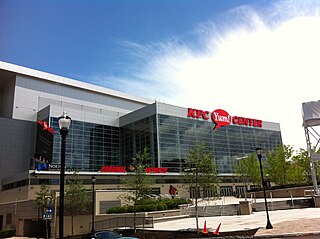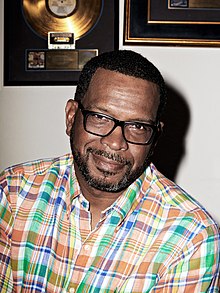The Baylor University basketball scandal occurred in the early 2000s, when Baylor University's men's basketball program was investigated and punished for numerous infractions by the National Collegiate Athletic Association (NCAA). The scandal broke out after the 2003 murder of Baylor basketball player Patrick Dennehy. Dennehy's teammate Carlton Dotson pleaded guilty to the murder and was sentenced to a 35-year prison term.
Kirby Hocutt is the athletic director at Texas Tech University in Lubbock, Texas and the Big 12 representative to the College Football Playoff committee. Additionally, Hocutt is the chairman of the NCAA Division I Football Recruiting Subcommittee. Hocutt formerly held the same position at Ohio University in Athens, Ohio from 2005 to 2008 and the University of Miami in Coral Gables, Florida from 2008 to 2011.
William Stephen Arnsparger was an American college and professional football coach. He was born and raised in Paris, Kentucky, served in the United States Marine Corps during World War II, and graduated from Miami University (Ohio) in 1950. Immediately upon graduation, Arnsparger was hired as an assistant coach with the Miami football program, beginning a long career in the profession.
The death penalty is the popular term for the National Collegiate Athletic Association (NCAA)'s power to ban a school from competing in a sport for at least one year. This colloquial term compares it with capital punishment since it is the harshest penalty that an NCAA member school can receive, but in fact its effect is only temporary.

In college athletics in the United States, recruiting is the process in which college coaches add prospective student athletes to their roster each off-season. This process typically culminates in a coach extending an athletic scholarship offer to a player who is about to be a junior in high school or higher. There are instances, mostly at lower division universities, where no athletic scholarship can be awarded and where the player pays for tuition, housing, and textbook costs out of pocket or from financial aid. During this recruiting process, schools must comply with rules that define who may be involved in the recruiting process, when recruiting may occur and the conditions under which recruiting may be conducted. Recruiting rules seek, as much as possible, to control intrusions into the lives of prospective student-athletes. The NCAA defines recruiting as “any solicitation of prospective student-athletes or their parents by an institutional staff member or by a representative of the institution’s athletics interests for the purpose of securing a prospective student-athlete’s enrollment and ultimate participation in the institution’s intercollegiate athletics program."
Eric Ramsey was a defensive back for Auburn University's football team in the early 1990s who used a tape recorder to secretly record conversations between his football coaches and Booster "Corky" Frost regarding an illicit player payment scheme. Ramsey's allegations also included racist practices at Auburn, including disapproval of inter-racial dating in the community and segregation of black and white players in the resident athletic dorm. After his tapes were revealed, Auburn received strict penalties and NCAA probation. This scandal prompted Coach Pat Dye's resignation and preceded the hiring of Samford University football coach Terry Bowden.

Yahoo! Sports is a sports news website launched by Yahoo! on December 8, 1997. It receives a majority of its information from Stats Perform. It employs numerous writers, and has team pages for teams in almost every North American major sport. Before the launch of Yahoo Sports, certain elements of the site were known as Yahoo! Scoreboard.
Paul T. Dee was general counsel and athletic director of the University of Miami in Coral Gables, Florida. He held the position of University of Miami athletic director from 1993 until 2008.
Michael L. Huyghue is a sports lawyer and businessman and former commissioner of the United Football League, having served in that capacity since the league's founding in 2007. He was previously a member of the legal department of the NFL Players Association before joining the NFL Management Council. Uniquely positioned from having thus worked on both sides of the player/management relationship, he called for the 2011 NFL labor standoff to be settled by keeping the lawyers for both sides out of the negotiating process.

Jacory Sherrod Harris is an American former professional football quarterback.
In the University of Southern California athletics scandal, the University of Southern California (USC) was investigated and punished for NCAA rules violations in the Trojan football, men's basketball and women's tennis programs.

The 2011 Miami Hurricanes football team represented the University of Miami during the 2011 NCAA Division I FBS football season. It was the Hurricanes' 86th season of football and 8th as a member of the Atlantic Coast Conference. The Hurricanes were led by first-year head coach Al Golden and played their home games at Sun Life Stadium. They finished the season 6–6 overall and 3–5 in the ACC to finish in a two-way tie for fourth place in the Coastal Division. The Hurricanes served a self-imposed bowl ban due to an ongoing NCAA investigation.
Nevin Karey Shapiro is a convicted felon who received a 20-year prison sentence for orchestrating a $930 million Ponzi scheme. According to interviews, he allegedly engaged in rampant violations of NCAA rules over eight years as a booster for University of Miami athletes. Shapiro allegedly provided football players cash, goods, prostitutes, and assorted favors.

The University of North Carolina academic-athletic scandal involved alleged fraud and academic dishonesty committed at the University of North Carolina at Chapel Hill (UNC). Following a lesser scandal that began in 2010 involving academic fraud and improper benefits with the university's football program, two hundred questionable classes offered by the university's African and Afro-American Studies department came to light. As a result, the university was placed on probation by its accrediting agency.

The University of North Carolina at Chapel Hill football scandal is an incident in which the football program at the University of North Carolina at Chapel Hill was investigated and punished for multiple violations of National Collegiate Athletic Association (NCAA) rules and regulations, including academic fraud and improper benefits to student-athletes from sports agents. The NCAA investigation found that a tutor had completed coursework for several football players, among other improper services. Additionally, the investigation found that seven football players received thousands of dollars in valuables from sports agents or people associated with agents. The NCAA sanctions led to a postseason ban, a reduction of 15 scholarships, and three years of probation. It was the second major infraction case in North Carolina's history and the first since the men's basketball program was sanctioned in 1960 for recruiting violations.
The definition of amateurism within the context of collegiate sports has evolved since it was first pronounced by the NCAA upon its inception in 1906. In its early stages, changes in the NCAA's core beliefs in what a student-athlete should be rewarded and allowed to accept financially for their athletic talents had its effects on the definition of amateurism. Over the course of the 20th and early 21st century, regulatory changes, court claims, and the beliefs of NCAA authority about student-athlete compensation further developed what an amateur collegiate athlete is entitled to receive. This evolution is what impacted the evolving logistics of the NCAA Bylaw 12, which explains the current definition of amateurism and what it grants or restricts a collegiate athlete to be able to receive as compensation for their participation. These guidelines have been described to both benefit and unjustifiably limit the student-athlete and the success of institutions’ athletic performance. This debate has been a strong driver in court claims against the NCAA and the mainstream controversy about what student-athletes should have the right to receive financially.

The 2015 University of Louisville basketball sex scandal involved National Collegiate Athletic Association (NCAA) rules violations committed by the University of Louisville men's basketball program.
The 2017–18 NCAA Division I men's basketball corruption scandal was a corruption scandal, initially involving sportswear manufacturer Adidas as well as several college basketball programs associated with the brand but now involving many programs not affiliated with Adidas.
In 2023, the National Collegiate Athletic Association (NCAA) opened an investigation into sign stealing accusations against staff members of the Michigan Wolverines football team. The investigation is ongoing and has not been closed.












